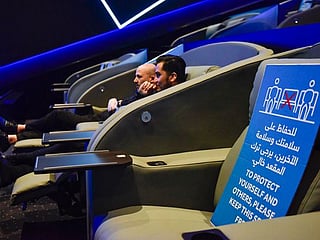Paying spouse 'salary' and pension for parents no big deal, says Indian billionaire in UAE Sohan Roy
Roy's Sharjah-based Aries Group has charted its way out of COVID-19 created blues

Also In This Package

Dubai: Sohan Roy is still not sure what the fuss is all about.
It was early this year that the Sharjah-based Indian businessman’s holding company – Aries Group – announced that it would pay a ‘salary’ for the spouses of those employees who did not have careers of their own. The only criterion was that the employee had to complete three years at Aries, and which would see the spouse being paid 25 per cent of the salary. They should also have been married for three years. (Mind you, there is no gender bias in passing this on – husbands of staffers at Aries and who found them themselves without a job were given roles at group companies.)
Aries employs around 1,000 at its Sharjah base and the spouse payouts – made on the 28th of each month – reach more than 200 households. (Roy’s wife, Abhini, too gets a monthly cheque. And her mother receives three pension payments a month - with three children being associated with Aries.)
“I don’t see why outsiders should see this as a cash burn on our part – we have made the savings from internal processes, our margins are improving post-COVID-19,” said Roy, whose group specialises in marine and non-marine project inspections. The oil and gas industry remains a major clientele of the group, which is made up of 57 companies.
“Senior management – that definitely includes me - stopped flying Business a long time ago, and employees made their own contributions to help come with the cashflow to support spouse payouts.
“Let's not forget that Aries was also the first company that paid monthly support for the parents of employees – we started that 13 years ago. But it didn’t make much of a stir then.”
Not immune
That Aries took on the additional costs even as businesses are recovering from COVID-19’s impact does not necessarily mean the Group sailed through the crisis. The first couple of months after the pandemic broke saw Group operations take a 40 per cent hit.
“Our work is based on sending staff to go over project checks in more than 100 countries, maybe for weeks and even a year or so depend on the project length,” said Roy. “They provide their skills to offering design modifications where needed, make sure project work adheres to quality parameters, etc.
“But COVID brought almost all of that overseas activity down overnight.”
Change direction
After that initial shock, it was than that Aries pivoted to taking on more local projects – even those that in the past it would not have taken on. “We had to change strategy, and take on more local jobs,” said Roy.
“We did this because we had to engage our employees – in those weeks and months, the focus was on making sure of that rather than chasing profits. It meant doing work where operating margins were lower than in the pre-COVID-19 days – but it worked.
“We came up with an in-house efficiency improvement management programme, which helped raise efficiencies and save on cash where possible.”
Aries operates an expansive base in Sharjah, where much of the marine-related services and inspections get done. In all, the Group employs around 1,900. “We are getting some good work done designing ‘green’ ships, and have done about 250 such projects in 2020 alone,” said Roy. “The competition wouldn’t have done more than 20.
“There’s a sub division that does a lot of work with AR (augmented reality) and VR (virtual reality) for 3D mapping, underwater inspections, etc. It’s about stretching the possibilities – we are getting there.”
Fixated on cinema
One thing no one can do is pigeonhole Roy’s ambitions… or areas of specialisation. If someone were to ask you to name one Indian businessman who is also a movie director, Roy has been there and done that. Name the Indian businessman whose movie – DAM999 - was a choice for the 2011 Oscars? You guessed right.
Movies are a passion with Roy, and where he has some strongly expressed views. “It’s an industry where a few individuals play around and there are no centralised industry-wide standards,” is a lament of his.
“There is so much valuable content in Indian movies – Aamir Khan movies are making more money these days in China. Malayalam movies are increasingly popular in South Korea. But are we doing enough to make Indian movies bigger and more universal?”
One of Roy’s group companies is into integrated dubbing systems, which help dub Indian movies into 30 odd international languages. The stated aim is to reach up to 100 international languages over the next two years.
“We are still way behind on all the possibilities we should be generating with Indian movies,” said Roy. “Despite every effort, 4K quality ‘epic’ movies are still rarely made – that’s what is needed to get audiences back into cinemas and make them aware of the full potential of 4K-enabled technology. The odd Bahubali or KGF are not enough.”
As Roy keeps waiting for the 4K cinema revolution to take hold in India, he keeps producing one Malayalam movie a year. He takes on occasional role in a movie as well when the mood strikes. As for his next directorial venture, he still hasn’t put a definite marker on that one yet.
For now, he is anchored to charting Aries next round of growth… and making sure his workforce operates as one big, happy family.
If that means still travelling in Economy, so be it. “If it’s for Aries business, that’s the way I do it…”
Sign up for the Daily Briefing
Get the latest news and updates straight to your inbox








